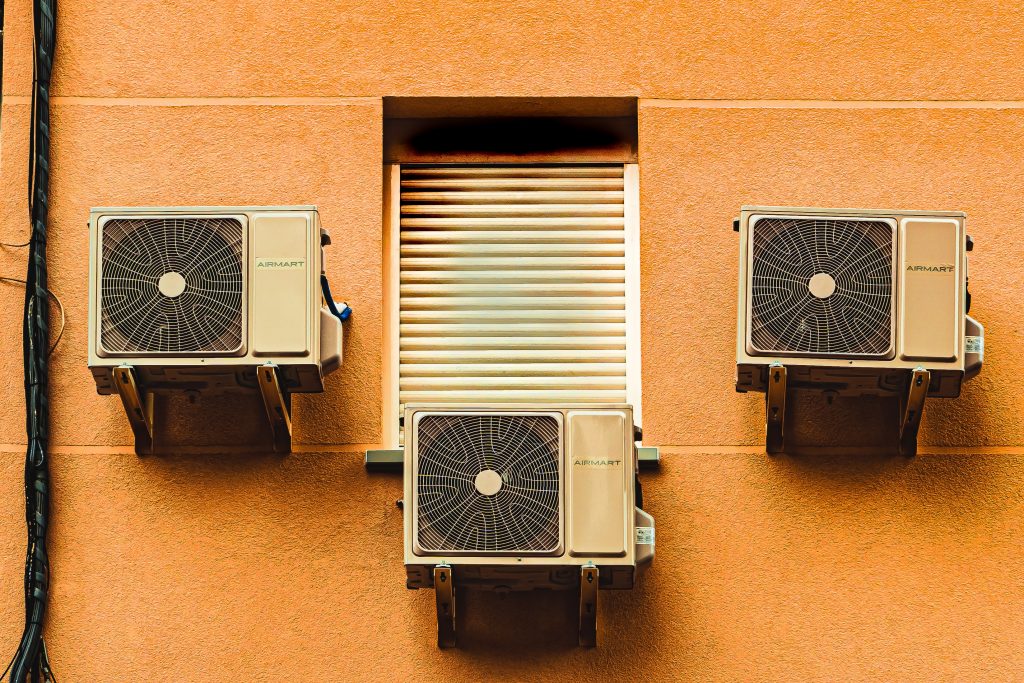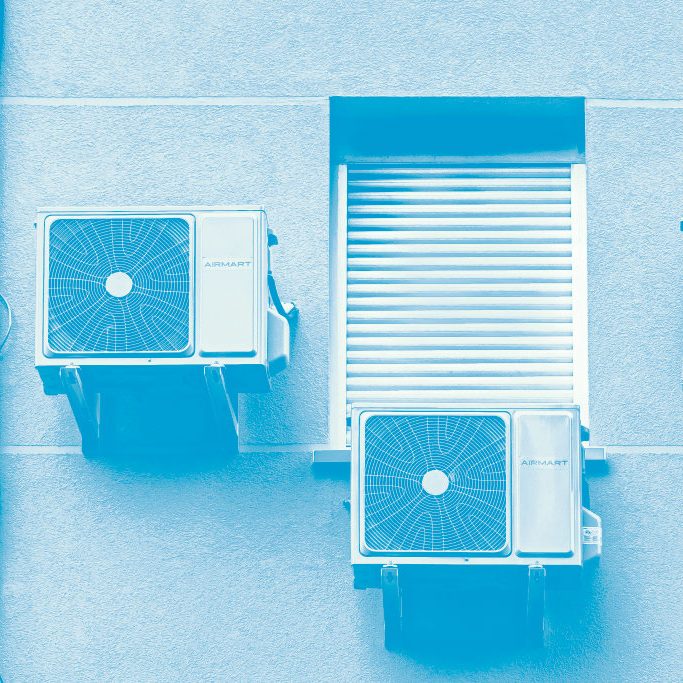
Part #2 – air conditioning
Air conditioning is heating up the world
In 2018 Japan had the hottest summer ever with 41 degrees Celsius. In 1 week it killed 65 people and thousands of them were hospitalized for heat related conditions. To show the broad and often negative influence of heat, a scientist in Singapore calculated that there are 27 ways to die from the heat. To name one, in extreme heat, our cells can just fry and die. The heat has a negative influence on our sleep, concentration, and life satisfaction in general. This is also why marathons in Singapore are the slowest ones in terms of the results in the time needed to reach the distances.
Air conditioning
Air conditioning consumes 60% of all energy in buildings in Singapore. Every air conditioning is ejecting heat to the outside, which is sucked into the next air conditioning as the warm air goes up. It leads to some kind of domino effect where every higher air conditioning is heated up but the lower one. As a consequence, the residents living on the highest floors need to spend on air conditioning the most.
Air conditioning makes people in Singapore switch to indoors life and whenever they are outside, in general, they look for any shade instead of freely using the city. At some point, people would need to spend their whole life indoors. At some point, people would need to spend their whole life indoors. At the same time, even a 1-degree Celsius warmer air conditioning air temperature indoors can save up to 5% of the air conditioning cost.
Paradox
Every air conditioner produces heat and ejects it outside to keep the indoors cooler. There is a paradox because the device that cools people off makes them warmer outside. On a bigger scale, the device that provides people with cooling and saves them from unfavourable conditions increases the urban heat island and threatens people’s lives in the future.
In 2018 the United Nations’ report gave a clear message: we have 12 years to reduce carbon emission by half so as not to risk a climate catastrophe. In Singapore, people will soon not be able to use open public architecture and spaces. This is why we need to act, and this is why my master thesis is about microclimate and tackling.
How does the air conditioning work?

My diagram visualises how the air conditioning works. They are placed over each other and every air. The condition sucks in the warm air from the one below. So technically, they need to work even more. Living on the top floor means the biggest expenditures for the AC.
How to tackle that?
The widespread reliance on air conditioning in the US is explored in Eric Dean Wilson’s book After Cooling: on Freon, Global Warming, and the Terrible Cost of Comfort. The book talks about how the air conditioning became and effective way to cools us off, but also talks about the harmful chemicals that make our lives comfortable also contribute to the climate crisis.
Freon – The modern refrigerant – gas in fridges, freezers, and air conditioners — was first introduced in the 1930s. The chemical escaped into the air over time, ripping a hole in the ozone layer. In 1987, a global agreement was reached to ban the production of the gas — although every year an ozone hole reappears over Antarctica in October.
HFCs, the chemicals that replaced the banned refrigerant, while not ozone-depleting, their global warming potential can be hundreds to thousands of times that of carbon dioxide. Today, the most commonly used refrigerant in air conditioners and cars is HCFC, which has much smaller ozone-depleting potential.
But apparently, Wilson’s book is not a call to ditch air conditioners. He acknowledges that in a heatwave, refrigerants are life-saving. Prolonged hot temperatures can diminish people’s mental and physical capacity, and air conditioning is an effective heat management tool in classrooms. But before the widespread use of commercial air conditioning, our world was cooler — and in seeking comfort we have warmed our planet.
In an interview, Wilson says:
In a heatwave, you have people who are susceptible to heat-related illnesses.
These are people who tend to live in neighborhoods that have less access to natural shade, fewer trees, less access to parks, more asphalt that absorbs heat and can make areas of the city 10F hotter in some places.
He continues that ‘low-income residents are also more vulnerable. Even if they can afford the unit, they might be reluctant to turn it on because they might be behind on their energy bills.’ There is also potential for blackouts, because once we are too warm in our city, everyone just turns on the air conditioning.
He emphasizes the need for things like community solar, or community-controlled energy, rather than having a monopoly company that controls it. Because when profit is the driving motive, monopolies are not interested in saving lives.
What if we don’t want, or can’t afford, AC?
- The most low-tech solution is planting more trees. Initiatives to make sure that there is lush vegetation on every street in New York, especially in working-class neighborhoods, where there tend to be less trees, I think that’s crucial.
- Another solution is sustainable design that incorporates passive cooling. There are innovative architects who are looking at nature, things like termite mounds, beehives, things that exist in the wild and regulate temperature.
- Understanding how to shade, how to give light, but without direct sunlight that will heat a room. Things like incorporating natural wind into a room, and using better building materials.
What are Wilson’s hopes on what people will take away from his book?
I’m asking for us to really consider how our level of comfort and what we’ve defined as comfort has been constructed.
And whether our level of comfort has actually led to a planet that’s uninhabitable. I’m not calling for all of us to suffer at all, I’m actually calling for us to again, to redefine what it means to be comfortable.
Do you agree with Wilson?
Sources:
- Article: https://www.theguardian.com/environment/2019/aug/29/the-air-conditioning-trap-how-cold-air-is-heating-the-world
- After Cooling: On Freon, Global Warming, and the Terrible Cost of Comfort by Eric Dean Wilson
- My master thesis: https://issuu.com/marcinzebrowski/docs/master_thesis_booklet_marcin_zebrowski
Do you want to listen to the podcast episode, that the article bases on? Click below.
57: How is air conditioning heating our cities?

